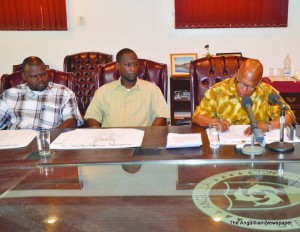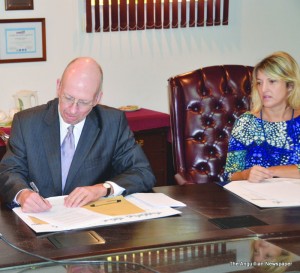

Anguilla’s Chief Minister, the Hon. Hubert Hughes, came down from his hard stance, taken on the British Government’s partnership policy for the Overseas Territories, and signed the Framework for Fiscal Sustainability and Development (FFSD) on Friday, April 5. Prior to signing, he prefaced his address by saying: “Today, I am signing one of the most critical statements ever made in my political history.”
Anguilla is the last territory to sign the two-year-old document which was signed by the other territories as the Framework for Fiscal Responsibility (FFR).
The signing by Chief Minister Hughes took place in the Executive Chambers. The document was initialled by His Excellency Governor Alistair Harrison, with the appropriate space reserved for the signature of the Minister for the Overseas Territories, Mr. Mark Simmonds.
Immediately after the signing ceremony, and addresses by the Chief Minister and the Governor, a Ministry of Finance team of technocrats, led by Dr Aidan Harrigan, entered the Governor’s communication room for a teleconference with their counterparts in London. It is understood that, apart from the signing of the partnership document, the discussions centred on matters related to the 2013 Budget which was not approved by the Foreign and Commonwealth Office pending the Anguilla Government’s agreement to the FFSD.
The signing of the document has now cleared the way for the budget to be approved. Recurrent Expenditure is estimated at EC$188.12 million; Recurrent Revenue EC$193.1 million; and Capital Expenditure EC$32.6 million.
The following is the text of the address delivered by Chief Minister Hughes (released by the Ministry of Finance) without the preface mentioned above:
CHIEF MINISTER PRESS RELEASE ON FRAMEWORK FOR FISCAL SUSTAINABILITY AND DEVELOPMENT
My Fellow Anguillians,
Through this medium of the Press Corp invited here this morning to witness my signing on behalf of the Government of Anguilla of the Framework for Fiscal Sustainability and Development (FFSD) with the UK Government, I would like to make the following comments.
As indicated at the most recent public forum on the matter (which was held on 18th March, 2013 at the Rodney MacArthur Rey Auditorium and carried live by several Radio Stations), the UKG in April 2011 submitted for the GoA’s consideration a draft Framework termed the Framework for Fiscal Responsibility (FFR) to replace the 2003 Borrowing Guidelines which had served as the prudential guidelines concerning fiscal matters. Those Borrowing Guidelines proved to be inflexible and unable to withstand the rigours of the financial and economic crisis that rocked the World and our small nation since 2008.
It has taken some time to reach this point, but this was necessary, not only to achieve consensus with the UKG and to arrive at an arrangement that both sides can live with but also to secure what is best for you the Anguillian people. The FFR was considered within Government, taken to you the people and also shared with our regional and international development partners for their review and technical support in order to ensure that we were doing the right thing and securing what was best for Anguilla. We also discussed with our sister UK Overseas Territories that were also subject to these arrangements and carefully monitored their realities as a result of their Frameworks in operation. I take this opportunity to thank all who supported us during this process. In short, we took this very seriously.
As indicated at the public forum on 18th March, 2013, following the commencement of formal negotiations in Anguilla in September 2012 and further discussions in London in December 2012 I wrote to the UK Minister with responsibility for the Overseas Territories the Hon Mark Simmonds on December 14, 2012 outlining the GoA’s position on the proposed FFR (it should be noted that this correspondence was considered and approved by Executive Council).
Minister Simmonds responded in correspondence dated March 6, 2013 acknowledging the progress that had been made in the negotiations between the two sides to date. He however indicated that the UKG was not prepared to agree to one of the GoA’s main requests, namely that the fiscal anchor utilised during the Borrowing Guidelines regime – Debt to Recurrent Revenue – be changed to Debt to GDP.
At the public forum on 18th March, 2013 I indicated that, acting on advice of the GoA technical officials, I along with my Ministerial colleagues were prepared to continue with Debt to Recurrent Revenue fiscal anchor provided that the Framework to be agreed and the enabling legislation would be reviewed 5 years from implementation.
After further discussions in Executive Council and among UKG and GoA technical officials I can state that we have arrived at the point where the new framework, the Framework for Fiscal Sustainability and Development, FFSD, for short, can be signed.
So my people, what are the next steps?
In Minister Simmonds’ letter of 6th March 2013, he spoke to the UKG’s undertaking to provide a grant of the equivalent of EC$12.5 million for 2013, demonstrating their commitment to Anguilla’s economic growth and development in a bid to ensure that we can undertake crucial projects without using our fiscal reserves. It should be noted that originally we requested a grant of EC$140m over a period of 3 years to support our capital development. However, we accept this proposal and we express our thanks to the UKG. Minister Simmonds spoke to the effect of the UKG and GoA agreeing on a Framework to replace the 2003 Borrowing Guidelines (and within this the establishment of Capital Development Fund endowed with the above mentioned grant) as to, and I quote “put us in a position to move forward quickly to agreement on the 2013 Budget”.
We thank Minister Simmonds for this undertaking to move ahead with UKG assent of the GoA’s 2013 Budget, which normally should have taken place in December 2012.
Operating on a Provisional Budget, which the GoA has been doing since January 1, 2013, is never ideal and comes with its own set of complications, not only for our internal operations but also for our partnership with the European Union. UKG assent to the GoA’s annual budget is a key supporting factor in EU financial support through the European Development Fund (EDF) programme. The 2nd tranche of EDF 10 Funds is expected shortly. . As the Anguillian public would recall, the EU Ambassador to Barbados and the OECS, Mr Michael Barford, attested to this in his comments to the Press a few weeks ago in connection with his visit to attend the 3rd Annual Review of Anguilla’s Medium Term Economic Strategy (MTES) covering the period 2010 – 2014.
In closing let me reiterate that we look forward to receiving UKG assent of GoA’s 2013 Budget at the soonest but no later than April 30, 2013, the receipt of the EC$12.5 million grant to endow the Capital Development Fund, and we commit that with the support of the UKG in terms of legislative drafting assistance, and adherence with our legislative processes, to have passage of the associated FFSD legislation by 30th June, 2013.
I thank you for listening.
May God bless you, and may God bless Anguilla.
Governor Harrison made the following address as issued by his office:
I would just like to say, on my own behalf and on behalf of the British Government, how delighted I am that the FFSD has been signed by the Chief Minister. I have initialled it on behalf of Mark Simmonds, the Minister for the Overseas Territories, who will sign as soon as we send it to him. As the Chief Minister said on 19 March, the key principles of the FFSD are:
• Effective medium-term planning, to ensure that the full impact of fiscal decisions is understood
• Putting value for money considerations at the heart of the decision making process
• Effective management of risk; and
• Delivering improved accountability in all public sector operations.
We believe that agreeing to this new framework will ensure transparency and accountability and ensure that in future financial processes are free from corruption and abuse.
I hope that discussions over the 2013 budget can now be finalised quickly – they will continue with a teleconference immediately after this ceremony is over. One particular concern in London was that the budget as drafted paid for some – very necessary – infrastructure development by running down the reserves to the tune of about EC $12 million. The new Capital Development Fund to be set up under the FFSD will take care of that hole in the financial accounting with a contribution of approx EC$12 million from the UK. This will allow infrastructural work to go ahead whilst preserving roughly the present level of reserves.
An agreed budget will be a major step forward, although of course the hold up in the budget has not had any affect on revenue generation – all revenue measures have been assented to promptly – and spending has also proceeded on a month by month basis.
The next task is to get the FFSD enshrined in law, and the Chief Minister has undertaken to put legislation to the House of Assembly in order for them to decide about it by the end of June at the latest. I am pleased to announce that the Governor’s Office is able to fund some assistance to the Ministry of Finance and AG’s chambers with the drafting so that there will be no hold up before further public consultation as necessary.
I would like to congratulate all those who have been involved in the negotiations of the FFSD over the last two years on both sides of the Atlantic, in particular Aidan Harrigan and his team at the Ministry of Finance. Above all I congratulate the Chief Minister on signing what will be a long-lasting legacy of this government.








